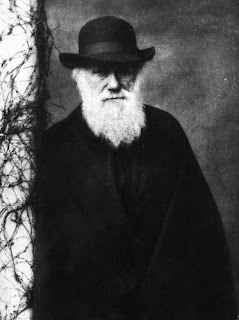
In this article by Olivia Judson, published today in the New York Times, the author points out that Darwin was a genuinely nice guy. A lot of scientific history is clogged with big egos. Newton versus Hook. Lamarck versus Cuvier. Watson and Crick. But Darwin was just a good, humble guy.
He loved his wife and children. He was an infirm man, so he didn't like leaving home very often to rabble rouse or augment his legacy. His great adventure, the voyage aboard the H.M.S. Beagle as the ship's naturalist, began when he was 22. During the course of the 5 year journey, he began contemplating the evidence for speciation and evolution. He arrived home, wrote a book about his travels and did a lot of thinking and even more research.
He had an idea of how life might evolve, but he also understood the implications of his ideas. His wife was an intensely religious woman as was Darwin who became an agnostic only after the death of one of his young daughters. He understood that by suggesting species could change - and implying man was a part of the process - he would be forcing people to seriously consider their faith.
So he sat on his ideas. He wanted to test them and discuss them at length before causing an unnecessary debate. Through 23 years of experimentation and observation on barnacles, orchids, pigeons, and seeds, he finally began writing The Origin (Die Entstehung der Arten to Germans). As he wrote, he received a manuscript from a young naturalist named Alfred Wallace who's insights into natural selection could have served as an abstract to the Origin of Species. Darwin knew it was time to let his ideas into the world.
Science historians are always quick to remind their audience that Darwin and Wallace presented the theory of Natural Selection at a meeting of the Linnean Society in London. Wallace was in Southeast Asia, and Darwin did the talking in London. In many ways we are fortunate Wallace wasn't in town at the time. He was an iconoclast and a sometimes impulsive young man. He knew the implications of Natural Selection and was spoiling for a fight with the establishment. Darwin took his time and let his ideas speak for themselves (or let Thomas Huxley do the speaking for him).
Darwin was not a genius in the sense of Newton or Einstein, men who conceived their ideas through brilliant flashes of insight. At an exhibit about Einstein, a plaque explained that if Einstein hadn't existed, we would have waited a long time for Relativity.
Multiple scientists would probably have reached Darwin and Wallace's conclusions if they hadn't existed. But, Darwin possessed a keen power of observation and measured patience that is rare in scientists from any century. He thoroughly tested his theory before committing to it. He ruminated and considered its implications. In today's scientific climate, the race to publish and constantly fight for funding often drives measured thought from the scientific brain.
Darwin foresaw the emergence of "Social-Darwinism," the misunderstanding of his theories that led some of his contemporaries to posit social classes were a product of "Survial of the fittest": the rich got that way because they were inherently better. Darwin saw class as social injustice, not the product of evolution, and tried to keep his ideas from getting mired in political agendas.
Darwin set off to make his scientific fortune when he was 22 (we'll celebrate that in 2031). I'm 23. As the world celebrates his life, I often wonder what it would be like to talk to Young Chuck as a peer. The kid had dropped out of medical school because he was queasy around blood, and didn't really enjoy all that reading he had to do while preparing to be a minister. He disappointed his father by taking off to sail the world because he loved catching butterflies, collecting plants, and watching animals. It's not really the best start for someone who would have to endure ridicule and misunderstanding for the next 2 centuries. He would start a scientific and social revolution. He would become a convincing writer.
He would grow up to lose his hair and grow an incredible beard. He would lead biology from the world of description into the science of causation. He didn't understand everything about how life works. Genetics wouldn't roll around as an active field of research until after his death and much of the world had yet to be mapped, but he never presumed to be infallible. He was simply trying to understand the world and went where the facts lead him.
Happy Birthday Charlie.



No comments:
Post a Comment